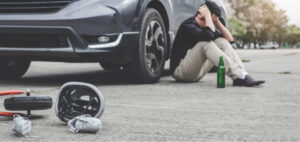A Closer Look at Alcohol-Involved Vehicle Collisions
A lcohol impairment or intoxication is a factor in about a third of the fatal car wrecks in Illinois. Many people think impairment and intoxication are the same thing, but as outlined below, they are not.
lcohol impairment or intoxication is a factor in about a third of the fatal car wrecks in Illinois. Many people think impairment and intoxication are the same thing, but as outlined below, they are not.
This substance adversely affects motor skills and judgement abilities. Alcohol is a depressant. All the body’s muscles move more slowly. That delayed reaction time significantly increases the risk of a collision. Furthermore, alcohol replaces sound judgement with a sense of euphoria. Therefore, many drivers take unnecessary chances.
This combination often leads to serious collisions. If that happens, a Rockford personal injury attorney can usually obtain substantial compensation for victims. That compensation typically includes money for economic losses, such as medical bills, and non-economic losses, such as pain and suffering. In some extreme cases, additional punitive damages are also available,.
First Party Liability
Most people are intoxicated after three (3) or four (4) drinks. That level of alcohol normally pushes the person’s BAC level above the legal limit. People who drink this much are usually unable to pass a battery of field sobriety tests, such as walking a straight line.
If the tortfeasor (negligent driver) was arrested for DUI, the negligence per se doctrine is generally available. Tortfeasors are typically liable for damages as a matter of law if:
- They violate a safety law, and
- That violation substantially causes injury.
Frequently, these individuals “beat” the DUI in criminal court. Or, they plead guilty to a lesser included offense, like reckless driving. But in a civil case, like a car crash claim, the jury determines all the facts. That includes guilt or innocence in a DUI or other criminal case.
Intoxication might begin after the third drink, but impairment usually begins after the first drink. “Buzzed driving” might not be illegal, but it is unsafe. Evidence of impairment includes:
- Erratic pre-crash driving,
- Statements the tortfeasor made about prior alcohol consumption.
- Bloodshot eyes,
- Unsteady balance,
- Odor of alcohol, and
- Tortfeasor’s point of departure.
That last bulleted item above raises the possibility of third-party liability. Bars, restaurants, and other commercial providers might be vicariously liable for damages in Illinois, as outlined below.
Victim/plaintiffs must establish impairment by a preponderance of the evidence (more likely than not). That’s the lowest standard of proof in Illinois law. So, a little evidence goes a long way.
Third Party Liability
Bloodshot eyes, odor of alcohol, and much of the previously mentioned circumstantial evidence often does more than establish driver impairment. If the person exhibited these symptoms at the point of sale, Illinois’ dram shop law probably applies.
Legally, victim/plaintiffs need not establish intoxication or even impairment at the point of sale. Illinois’ broad dram shop law applies if:
- Vendor sold alcohol to the person who caused the injury,
- That alcohol caused or substantially contributed to the person’s intoxication, and
- The intoxication substantially caused the victim/plaintiff’s injuries.
Vicarious liability theories like dram shop liability are especially important in catastrophic injury claims. Frequently, individual tortfeasors do not have enough insurance coverage to provide fair compensation for all the victim/plaintiff’s injuries.
Private alcohol providers, such as party hosts, might also be vicariously liable for alcohol-related car crash damages, under a theory like negligent undertaking.
Contact an Aggressive Attorney
Alcohol-related crash victims are entitled to substantial compensation. For a free consultation with an experienced Rockford personal injury lawyer, contact Fisk & Monteleone, Ltd. Attorneys can connect victims with doctors, even if they have no insurance or money.
